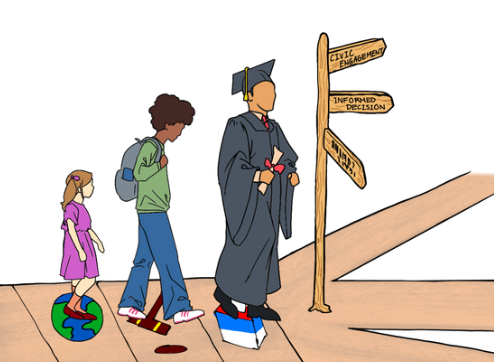Written by Sabrina Chen
A typical night for a Gunn student might include studying for the math midterm, reviewing for the AP Statistics test and preparing for an in-class essay. Meanwhile, a chat window from a best friend appears on the screen. It reads: “Hey, did you take the French midterm yet? Can you test me?” The response (to not let down the friend) includes detailed advice with several questions that were on the test. The student sends, “Can you send me your bio homework?” A photo of the homework appears, followed by a message: “That’s what friends are for.”
According to the Challenge Success Survey last spring, 87 percent of Gunn students have cheated. The most common types of cheating were working on an assignment with others when the instructor asked for individual work, copying someone else’s homework and getting test questions or answers from someone who already took the test. While there are many factors that may cause students to cheat, some of the most prevalent reasons are the desire to get into a good college, peer pressure, lack of time and the easiness of doing so and getting away with it.
Gunn’s culture promotes an emphasis on college admissions. Facebook posts with “Accepted to Harvard!” or “UCLA 2019!” get hundreds of likes. Because colleges are so selective today, students feel the pressure to get good grades. When they cannot achieve a desired grade, they resort to cheating. This temptation to cheat stems from the mindset that one has to maintain a 4.0 grade point average, win a gold medal at the Junior Olympics, receive a 2400 SAT score and volunteer for 500 hours or more in order to get into a good college. A student with an 86 percent on one test before the final might cheat to save the grade and maintain the straight-A streak. Additionally, there is always the question of whether one should spend five hours studying and receive a B or not spend any time at all and receive an A.
Peer pressure causes students to share homework and test questions. The general idea is that friends should help each other. If a student shares answers from a test, he is more popular with his peers, being called “open” and “friendly.” Other students, therefore, are more likely to share answers with him if they take a test before him. There is nothing worse than a swarm of people running to the unfortunate soul who has A period math and asking him about the midterm. Ironically, there appears to be a stigma among students against people who do not cheat. Commonly, someone who refuses to send answers is referred to as a “goody two-shoes” or “one of those kids.” This attitude is representative of survey results, which show that cheating is more normal than not. Students also compare grades all the time. It is horrifying to get a D or an F on a test only to be asked for a grade by a “I failed but I got a 94” friend. Meanwhile, refusing to answer questions relating to grades makes one appear too sensitive and weak.
Cheating is also easy and effortless at Gunn. A simple message to a couple of friends can give a student basically all the problems and answers from a midterm. A quick photo can provide homework answers. An easy Google search gives students access to thousands of pre-written essays. Students rarely get caught cheating because no one wants to be that kid who tells on everyone. Cheating is no longer a moral issue; it is an issue of necessity. Students need to cheat to meet their own expectations as well as their peers’.
In order to begin to fix the cheating issue and end the cheating culture, there are several steps that can be taken. First, teachers should more distinctly change up problems between periods, more so than they currently do. This way, G period students won’t have an advantage over those in A Period. Second, more students should stand up and be “the kid who doesn’t talk about tests.” The stigma against people who do not cheat should be switched to be against people who do cheat. Students should be more willing to criticize those who cheat; a simple, “Isn’t that unfair to the people who actually did the work or took the test?” would help resolve the problem. Finally, students should spread the message that a college doesn’t define a person and that grades are just numbers and letters. By lowering college and grade expectations, students will be more relaxed and less likely to cheat.



















